Republic’s Ragland-Castaneda Talks Organics Diversion, Food Recovery
The Waste360 40 Under 40 award winner shares information about her career and Republic Services’ food recovery and organics diversion efforts.

Tania Ragland-Castaneda has always had a passion for the environment and learning about how the world takes care of its resources, so it’s no surprise that she has taken that passion and turned it into a successful career at Republic Services.
Ragland-Castaneda, who was recently promoted from organics program manager to a municipal relationship manager, has covered a lot of ground since joining the industry about five years ago. She’s taken on tasks focused on organics diversion, food recovery and legislative and regulatory compliance, just to name a few.
We recently sat down with the Waste360 40 Under 40 award winner to discuss her career, Republic Services’ food recovery and organics diversion efforts and what she thinks the biggest challenge is with organics waste diversion.
Waste360: What brought you to the waste and recycling industry?
Tania Ragland-Castaneda: I’ve always loved the environment, and I’ve always been interested in environmental studies and sustainability. I’ve always believed that we live on one planet and that we have to take care of it. That means taking care of our resources and recycling, which is really a no-brainer.
There are many ways one can make a career out of helping the environment, and I felt what most resonated with me was how we handle waste and how we manage our resources at the end of the day.
I found myself wanting to study about recycling, and in my early 20s, I came across a program at Santa Monica College that offered vocational training and education. It was one of those things where it was a perfect fit and the right timing.
The program was a year long, and it really started the path for me as far as my education in the field goes and, ultimately, my career.
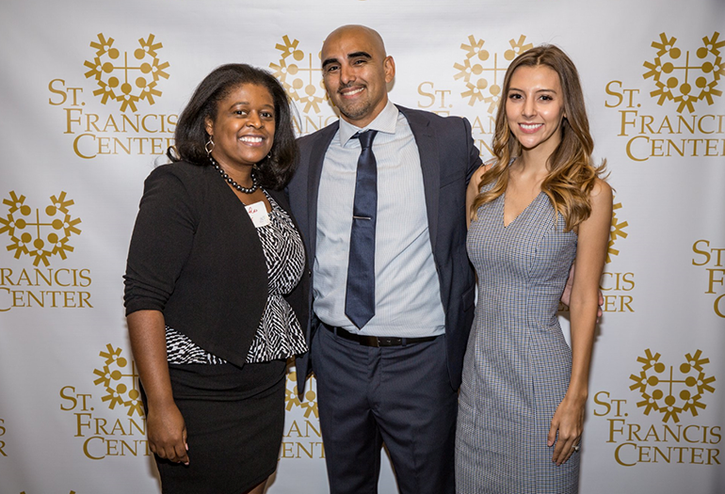
Waste360: Tell us about your experience with the Santa Monica College Recycling & Resource Management Program and how it helped you prepare for your role today at Republic.
Tania Ragland-Castaneda: It was such an instrumental part of me launching my career because it gave me such a great foundation to be able to enter the industry and know the acronyms, speak the language and understand the laws. It really ignited my passion for the industry, and of course once you’re trained and understand why it’s important to recycle and to think about consumption and economics, you’re able to offer that knowledge to customers.
In my role now, I’m able to meet with customers and give them the benefit of having studied the field enough to educate them a little more about their impact and what their participation means in the overall grand scheme of things.
Since I had such a good experience and the program had a huge impact on my lifestyle, livelihood and career, I really encourage schools and universities to think about their curriculums and think about something as simple as a recycling 101 class. You have your English 101, your math 101, and I would hope that there’s an environment 101 in the future where students can learn about the waste and recycling industry because it touches every single person as every single person contributes waste.
When you think about jobs, entrepreneurship and innovation, students need to be introduced to the world’s problems in order to be inspired to solve them. I think introducing these types of real-world programs, problems and curriculums will create a new wave of entrepreneurs.
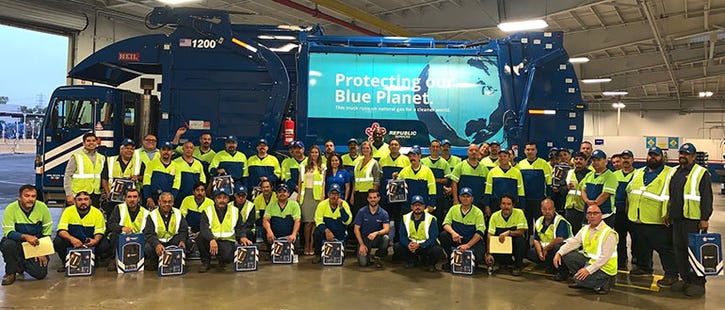
Waste360: Can you describe your role as organics program manager in detail?
Tania Ragland-Castaneda: Since being awarded, I’ve been promoted to one of our company’s municipal relationship manager roles on the government affairs side, but I can definitely speak to the organics manager role because it’s still integrated in what I do and what I did previously.
When you look at organics as an opportunity, there are many different facets and components to it. So, there needs to be someone who is tying together all those different components and identifying what organics means to a community.
For example, there’s a legislation component to organics management, which are the laws we have to address and comply with. There’s a program development component, which considers what works best for customers now and looks for what will work in the future. And there’s an infrastructure component, which looks at what is available now and what may be possible in the future.
As organics manager, I served as the bridge that tied all these pieces together, so we could create a comprehensive approach and organics program. My role was pretty interdisciplinary, as I worked with different types of engineers, businesses, policymakers and others to create a final product that ultimately serves the communities we work in and is right for businesses, our customers and the communities.
Waste360: You’re also part of Los Angeles Food Policy Council's Food Waste Prevention & Rescue Working Group. Tell us about that and your role in the working group.
Tania Ragland-Castaneda: That group is really more of a grassroots organization with various stakeholders, nonprofits, municipalities and people interested in the work. Many are working on independent projects or larger policies they want to share.
I’ve participated in the group, and I’ve seen the group grow tremendously. That growth speaks to how people are being more conscious about their footprint and more interested in learning about food and its impact.
There have been a lot of entrepreneurship opportunities that have emerged from the group getting together and discussing solutions. It’s really a community where people share their ideas, expand their network and learn about opportunities that may be available to them. My role in all of that has really been to represent our organization at the table and speak to how we’re making progress in the space.
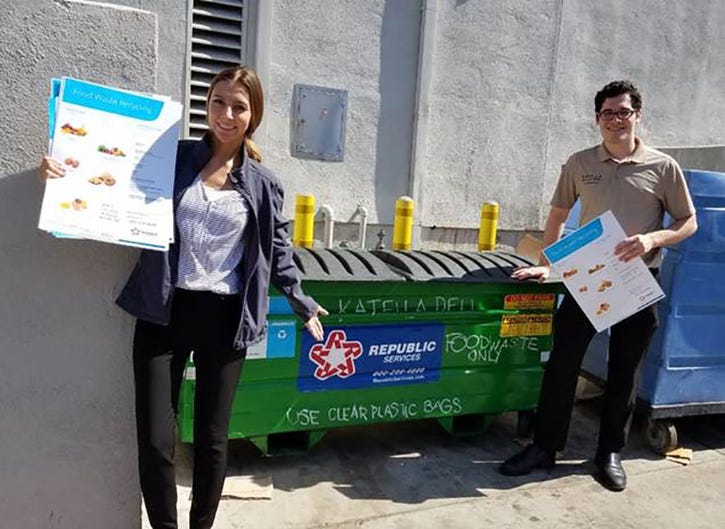
Waste360: You approached and developed a partnership with World Harvest Food Bank in the Los Angeles area. Tell us about that and your work with other food banks.
Tania Ragland-Castaneda: We have a variety of different food banks that we work with, and we believe in creating an inclusive environment where reputable food banks that have the necessary equipment and certificates of insurance are part of our outreach to customers.
World Harvest Food Bank is a nonprofit in a service area of ours, and we actually came together through a referral from a city staff member and the city’s provision for haulers to partner with nonprofits, food recovery organizations or reuse organizations.
We reached out to World Harvest to learn about who they were and what their operations were like. Then, once we were able to see the food bank in person, we saw there was an opportunity to partner and connect our customers with World Harvest.
World Harvest has been incredibly wonderful to work with, and they’ve allowed us to pilot programs, too. They’ve really encouraged ideas and new ways that we can work together.
Waste360: Tell us about some of the organics waste diversion and food recovery partnerships that you’ve helped develop.
Tania Ragland-Castaneda: I already mentioned that we partner with a number of food banks, but we also partner with different nonprofits because they offer unique services that may be an appropriate match for customers. For example, they may be able to handle packaged food or prepared food from a caterer.
We always try to match a customer with the food bank or nonprofit in closest proximity to them because it makes sense logistically. One good example is the pilot program we helped with between World Harvest Food Bank and the Los Angeles Zoo.
The pilot program helped redistribute more than 10 tons of food a month to the zoo and helped the zoo save between $5,000 and $10,000 a month just by piloting a program and building a new relationship.
The world has an abundance of food, and we live in such an abundant society that we want to make sure these resources are going to the right places. At Republic, we always take into consideration the food recovery hierarchy, where we first look to see if we can redirect food to people in need. If the food is not fit for human consumption, we go down to the next phase of composting or feeding animals.
Waste360: How have you helped others fulfill the mandates under AB 1826 and SB 1383?
Tania Ragland-Castaneda: We’re invested in the success of our customers and their regulatory compliance, and we want them to be successful for the long term. For AB 1826, we’re looking at what the exemptions are for the law, meeting with customers and gathering data to identify what issues may inhibit or merit the program. We’re doing our due diligence and meeting with every single customer that’s been impacted or subject to AB 1826 and AB 341. Through that data collection process, we’re able to then go back to our cities and provide comprehensive knowledge as to what is a good policy, ordinance, provision, good exemptions, etc. AB 1826 affects everybody—the customers, the municipalities, the haulers, the policymakers, etc.—and there’s not a one-size-fits-all solution, so we’re striving to be a leader in the space and to create programs that are going to be successful for the long term.
In regard to SB 1383, we’ve already done a lot of data collection, and we’ve already set up a lot of programs that fulfill SB 1383 with respect to food recovery. Now, we’re really watching to see what the final regulations are because if you put the cart before the horse, you’ve already started to approach the bill as if it’s finalized, and it’s not.
We’re happy that we’re ahead of the bill and that we already have programs in place that would fulfill the requirements if today’s draft regulation were passed.
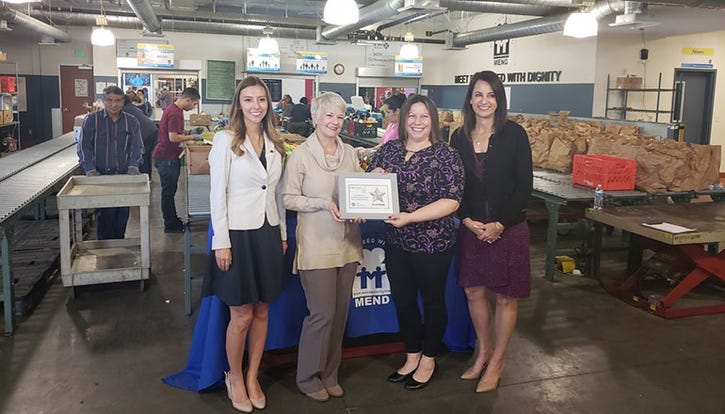
Waste360: What do you think is the biggest challenge with organics waste diversion?
Tania Ragland-Castaneda: I think the biggest challenge is that it’s a cultural challenge, and folks are just not used to participating in that way. I know in the future, probably 20 years from now, people are going to look back and say, “I can’t believe we didn’t compost or source separate at the restaurant level” because it’s a change of culture.
Look back to World War II, when being resourceful was a cultural and societal norm, and folks did not waste anything because it was so frowned upon by society. There was this huge embrace in World War II of being resourceful and doing your part, and we all rallied together for a common cause. That was successful, and we were efficient.
Now, fast forward to today, where we have the luxuries of convenience, and if a solution isn’t convenient, it’s not going to survive.
I think the biggest challenge now is getting people to be reinvested in the program, both culturally and societally. People know it’s the right thing to do, but we need to get to where composting and source separating is normal.
A lot of times, businesses will look at the time and labor costs that are associated with the program, but we have to work with them to change their behavior and get them inspired and energized about the positive impact they are having on the world, just like they did in World War II.
We’re getting there, and I think people care now more than ever. We’re working with the customer to ensure that the organics diversion or recycling program we’re developing works for them because we want to ensure it’s going to be successful for the long term.
At Republic, we really make sure we’re part of the process and deeply connected to ensure the customer is set up for success. We not only help customers set up their program, but we check in with them to ensure everything is running properly. It’s really a hands-on approach.
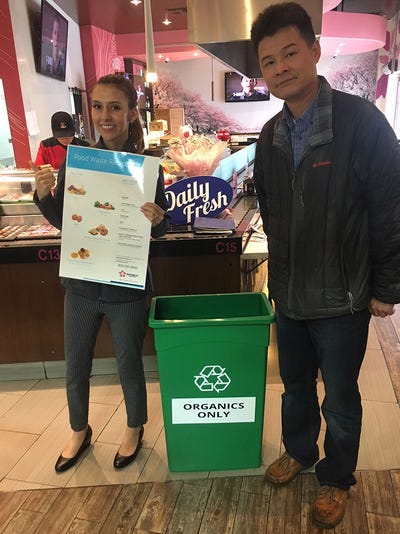
Waste360: What advice do you have for companies and municipalities looking to launch organics diversion programs?
Tania Ragland-Castaneda: Every municipality is unique, so every program is going to be different. You’re going to have to customize what’s right for the community and for the city given the infrastructure that you have access to.
You have to line up all of the components. I would start by looking at it from a high level and identifying where the infrastructure is, what the proximity is, how much material is being generated, etc. Once you’ve looked at all those pieces, you can start creating the right program.
I would also encourage others to conduct pilot programs, where you’re working with unique partners or customers to ultimately encourage them to participate in a long-term program. My concern is that when you do too much too fast too soon, it can really hinder the long-term success if there are a lot of changes happening immediately. So, start small, conduct pilot programs and figure out the lessons learned so that you can develop a more viable, permanent solution.
Waste360: Looking ahead to the future, what are your long-term career goals?
Tania Ragland-Castaneda: My long-term career goal is to continue growing here at Republic Services. I have an amazing group of leaders who support me, support my growth and support my ambition, so I see myself progressing here, whether it’s progressing in a local manner or at our corporate headquarters in Arizona.
I’m invested in the success of our company, and my company is invested in my success. I’ve been given so many opportunities in the early part of my career to pilot programs, and we’ve been able to do some exciting things because of that. I would love to do those exciting things on a larger scale.
The future is bright, and the future is exciting in the waste industry. Now is a great time to be involved, and now is a great time to really make a lasting change that helps our environment. I’m inspired, and I hope along the way that I can inspire others to join us in this incredibly exciting field.
About the Author
You May Also Like




